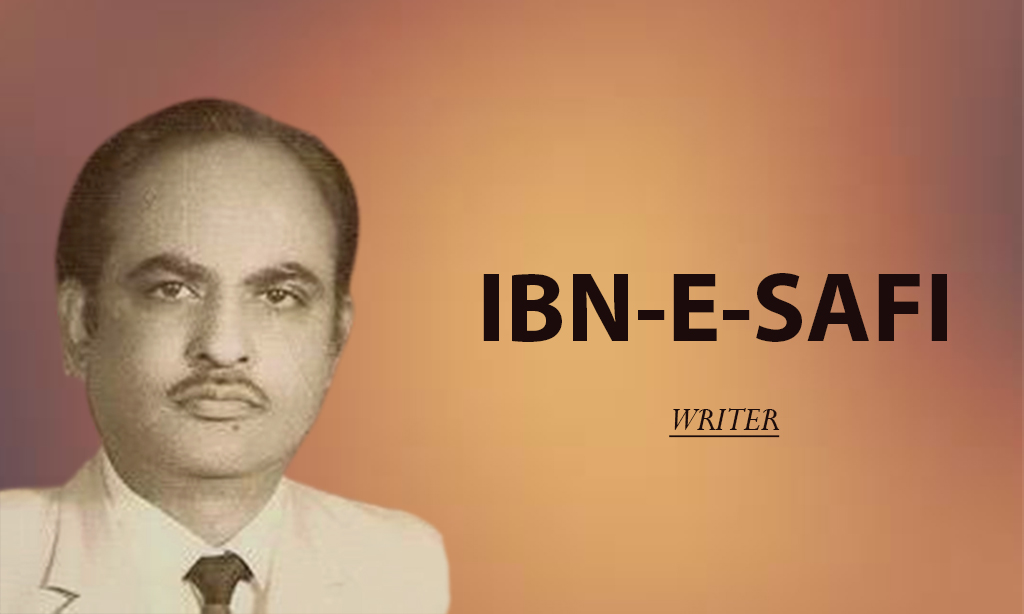Ibn-e-Safi as a writer, (26 July 1928–26 July 1980), also spelled ibn-e-Safi, was the pen name of Asrar Ahmad, a fiction writer, poet, novelist, and poet of Urdu Pakistan. The word ibn-e-Safi is the Persian expression, which literally means son of Safi, whereas the word Safi means chaste or righteous. He first wrote from British India in the 1940s and later from Pakistan after the independence of British India in 1947.
Early life and education:
Ibn-e-Safi as a writer, was born on July 26, 1928, in the town of Nara in the district of Allahabad, India. His father’s name was Sufiullah, and his mother’s name was Naziran Bibi. His ancestors were Hindus of the Kayashta community, who specialized in the fields of education and administration and converted to Islam many generations ago.
He received a bachelor of arts degree from Agra University, and in 1948, he started his first job at “Nikhat” publications as an editor in the poetry department. His initial works date back to the early 1940s when he wrote from British India. He also studied at the University of Allahabad, where he was a classmate of Professor Muhammad Uzair and a one-year senior to Mustafa Zaidi.
After the independence of India and Pakistan in 1947, he began writing novels in the early 1950s while working as a secondary school teacher and continuing part-time studies. After completing the letter and having attracted official attention as being subversive in the independence and post-independence periods, he migrated to Karachi, Sindh, Pakistan, in August 1952.
Personal life:
Ibn-e-Safi as a writer, Who married Umme Salma Khatoon in 1953, during the period from 1960 to 1963. .After experiencing a severe episode of depression, he spent some time in the psychiatry ward of a hospital. However, he recovered and returned with a best-selling Imran series novel, Dairrh Matwaaly, which Prime Minister Lal Bahadur Shastri-to-be published in India.
He wrote 36 novels of’ Jasoosi Duniya’ and 79 novels of the Imran series after his recovery from depression. In the 1970s, he informally advised the inter-services intelligence of Pakistan on methods of detection.
Main Work:
His main works were the 125-book series Jasoosi Duniya (The Spy World) and the 120-book Imran series, with a small canon of satirical works and poetry. Characterized by a blend of mystery, adventure, suspense, violence, romance, and comedy, his novels achieved massive popularity across a broad readership in South Asia.
Other work:
Besides humor and satire, he also wrote some short adventures, namely Baldraan ki Malika.
(The Queen of Baldraan), Ab Tak Thee Kahaan? Where have you been? Shumal ka fitna
(The Trouble from the North), Gultarang, and Moaziz Khopri. In these adventures, Abn-e-Safi takes the reader to various fictitious, exotic lands of his imagination. In 1959, Ibn-e-Safi started writing Aadmi Ki Jarain, a book based on human psychology. However, it remained incomplete due to his illness.
Early attempts:
Ibn-e-Safi started writing poetry in his childhood and soon earned critical acclaim in the whole South Asian community. After completing his bachelor of art, he started writing short stories, humor, and satire under various names, such as “Siniki,” a Canic soldier, and Tughral Farghan.In Nakhat magazine, he published several satirical articles that commented on various topics, ranging from politics to literature to journalism. His early work in the 1940s included short stories, humor, and satire.
Dhamaka, a film by Ibn-e-Safi:
Ibn-e-Safi wrote the story and screenplay for the film Dhamaka based on his novel Bebakon ki talash. The film did not get the publicity and fame it deserved and remains mostly forgotten. Muhammad Hussain Talpur produced Dhamaka based on the Imran series novel Bebakon ki Talash Urdu, titled In Search of the Outrageous. The film introduced Pakistani film actor Javaid Shaikh, then known as Javaid Iqbal, in the lead role of Zafarul Mulk.
Muhammad Hussain Talpur, the film producer, played the role of James, and actress Shabnam played the role of Sabiha.
The movie did not show the steam of Imran and X-2. Ibn-e-Safi himself recorded the voice of X-2. Actor Rehman played the role of villain for the first time. A rendition of the ghazal “Rah-e-talab me kaun kisi ka” by the singer Habib Wali Muhammad, which was written by Ibn-e-Safi, was featured in the film. The movie was released on December 13, 1974.
Famous Books:
Khaufnak imaret
Raat ka Shehzad
Aurat Farosh Ka Qatil
Tijori ka Geet
Neelay parinade
Ibn-e-Safi keun ka Raaz
Doctor dread
Chaalbaaz boorha
Shafak ke pujari
Khaufnaak hangama
Ibn-e-Safi death:
Ibn-e-Safi died on July 26, 1980, of pancreatic cancer at age 52. He was buried in the Paposhnagar graveyard in Karachi.


